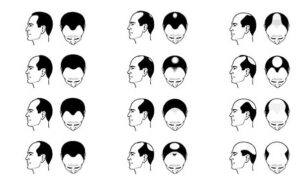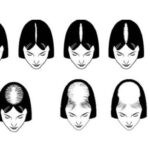Baldness
Male Pattern Baldness
Causes And Call For A Baldness Treatment In Males:
-
- Hormonal Imbalance:
Hormonal fluctuations, particularly during puberty when androgens become active, can lead to increased susceptibility to hair loss. This imbalance can result in the development of secondary sexual characteristics, such as facial hair growth, and may trigger male pattern thinning. - Medications:
Exposure to certain medications can serve as a catalyst for hair fall in men. Side effects of various drugs, such as steroids, can induce stress on the body, consequently triggering male pattern thinning. - Hectic Lifestyle:
Stress stemming from a busy lifestyle can elevate cortisol levels, the stress hormone, potentially leading to hair loss. Stress-induced hormonal fluctuations, including increased testosterone and adrenaline levels, may contribute to the conversion of testosterone into DHT (dihydrotestosterone), a potent form of testosterone that affects hair follicles’ growth cycle, resulting in hair thinning. - Genetic Causes:
Male pattern baldness, characterized by hereditary-pattern baldness, is often influenced by genetic, hormonal, and lifestyle factors. It is a naturally occurring condition that can manifest as a combination of genetics, hormones, and stress.
- Hormonal Imbalance:
Signs Which Indicate You Need Baldness Treatment:
– Receding Hairline
– Excessive hair loss (more than 100 strands per day)
– Rapid hair loss at a young age
– Decreased frequency of haircuts
– Scalp pain or itching accompanied by hair loss

Female Pattern Baldness
Female pattern baldness, characterized by gradual hair thinning, presents a significant concern for women, impacting hair volume and overall appearance. Exploring the underlying causes and available solutions is essential to address this issue effectively.
CAUSES AND CALL OF ACTION FOR BALDNESS TREATMENT IN FEMALES:
-
- Hormonal Imbalance: Women experiencing hormonal fluctuations, such as those during menopause or post-pregnancy, may encounter hair loss. Imbalances in estrogen, thyroid, and insulin levels can contribute to issues like hair thinning and reduced growth.
- Nutritional Deficiency: Iron deficiency, prevalent among women, can lead to hair loss resembling female pattern thinning. Ensuring adequate intake of iron-rich foods is crucial to prevent this condition.
- Hectic Lifestyle: Stress and poor hair care practices can exacerbate hair fall in females. Neglecting proper hair care, including irregular brushing and excessive use of harsh chemicals, may impede normal hair growth.
- Genetic Causes: Hereditary factors play a role in female pattern baldness, typically manifesting around menopausal years. Although less severe than male pattern baldness, this condition results in visible hair thinning and widening of the crown parting.
- Medications: Prolonged use or misuse of oral contraceptive pills, aimed at altering menstrual cycles, can contribute to female pattern baldness.
SYMPTOMS INDICATING NEED FOR BALDNESS TREATMENT:
-
- Increased hair shedding during combing
- Widening of the hair parting in the central scalp area
- Thinning of hair at the crown and top of the scalp
- Hair shaft breakage due to damage during combing
- Sudden hair loss following major illness or surgery
- Post-partum baldness, characterized by hair loss after childbirth or during lactation
A SOLUTION – BALDNESS CURE AT NIS
NIS offers specialized baldness treatment tailored to individual needs, emphasizing thorough assessment and personalized care.
-
- Consultation with a Trichologist is recommended to evaluate hair loss patterns and underlying causes.
- Post-chemotherapy hair loss requires immediate consultation with a Trichologist for appropriate treatment.
- NIS specialists will provide comprehensive guidance on addressing hormonal imbalances, hereditary factors, or other contributing factors to severe hair loss.
- Nutritional care may be incorporated into the baldness treatment plan for individuals with dry, brittle hair, emphasizing dietary adjustments and supplementation.
Nutrition Guidance for Baldness Treatment at NIS:
-
- Protein-rich foods such as beans, nuts, and dairy products promote hair growth.
- Consuming mineral-rich foods and staying hydrated are essential for maintaining hair health.
- Iron sources like green leafy vegetables and dates help prevent iron deficiency-related hair loss.
- Incorporating seasonal fruits and vegetables into the diet boosts energy levels and supports hair health.
- Avoiding empty calories and focusing on nutrient-dense foods contribute to overall hair health.
- Special hair-friendly foods like soy, green tea, and flax seeds offer additional benefits for hair growth and health.



